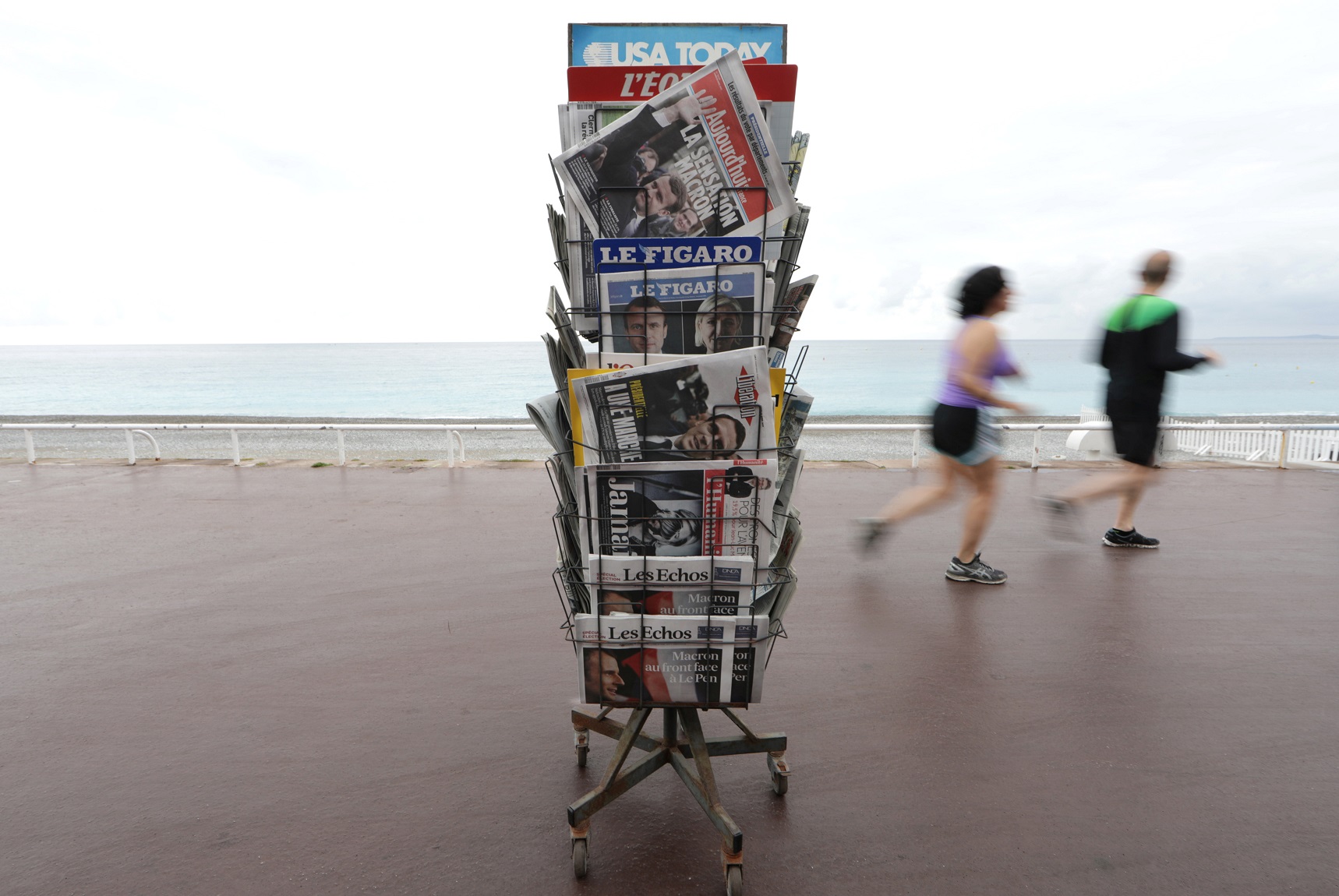بين السياسة والنضال خيط رفيع. البدايات كانت ملتبسة في معظم التجارب العالمية. عندما ظهرت أولى المغامرات الصحفية، كان من الصعب أن تفرق بين الصحفي والسياسي، والأديب أحيانا. السياسيون والأدباء هم من أسسوا الجرائد، ومع مرور السنوات والأعداد تحولوا إلى صحفيين يكتبون الافتتاحيات والتعليقات، ويجرون التحقيقات والحوارات، خدمة لأفكارهم ولقناعاتهم الأيدولوجية، وإخلاصًا لهذه الحرفة الجديدة التي ستسمى فيما بعد "مهنة المتاعب".
الفترة الذهبية للجرائد الحزبية والدعائية باتت جزءا من الماضي، رغم أن بعض هذه الصحف ما زال يقاوم، حتى في بعض الدول المتقدمة. في فرنسا مثلا، ما زالت جريدة "إيمانيتيه" (Humanité) تواصل الصدور. هذه الصحيفة التي أسسها جان جوريس -أحد آباء اليسار الفرنسي- عام 1904، كانت لسان الحزب الشيوعي الفرنسي منذ العام 1920 إلى العام 1994، ثم لم تعد ترتبط بالحزب تنظيميًّا، لكنها ما زالت تدور في فلك اليسار، تدافع عن أفكاره وتخوض معاركه.
بين السياسة والنضال خيط رفيع. البدايات كانت ملتبسة في معظم التجارب العالمية. عندما ظهرت أولى المغامرات الصحفية، كان من الصعب أن تفرق بين الصحفي والسياسي، والأديب أحيانا. السياسيون والأدباء هم من أسسوا الجرائد، ومع مرور السنوات والأعداد تحولوا إلى صحفيين يكتبون الافتتاحيات والتعليقات، ويجرون التحقيقات والحوارات، خدمة لأفكارهم ولقناعاتهم الأيدولوجية، وإخلاصًا لهذه الحرفة الجديدة التي ستسمى فيما بعد "مهنة المتاعب".
أما الأيدولوجيات الشمولية فلم تقرّ يوما بالحدود بين السياسة والصحافة وبين الدعاية والإعلام، كما كان عليه الأمر في ألمانيا النازية وروسيا السوفياتية.
قبل مدة، توفي الصحفي الفرنسي جان دانيال عن سن تناهز المئة عام. "ضمير الصحافة الفرنسية" كما أطلق عليه بعض زملائه، يختصر لوحده العلاقة بين السياسة والإعلام في أحد أعرق البلدان الديمقراطية. جان دانيال بنسعيد (اسمه الحقيقي) ولد في مدينة البليدة عام 1920، أيام كانت الجزائر تحت الاحتلال الفرنسي، وبدأ حياته سياسيًّا، مع ولع مبكر بالأدب والفلسفة. كان بإمكانه أن يصبح كاتبًا مثل صديقه ألبير كامو، لكنه تلقى صفعة عام 1940 غيرت مسار حياته.
عندما احتل الألمان فرنسا، قررت حكومة الماريشال فيليب بيتان المتعاونة مع النازيين، أن تسقط الجنسية الفرنسية عن يهود الجزائر. وهكذا وجد الشاب جان دانيال نفسه بلا هوية، ولم يتردد في التخلي عن طموحاته الأدبية، والتفرغ للمقاومة. المقاومة التي ستظل عنوانًا عريضًا لمعاركه الصحفية فيما بعد. في 8 يونيو/حزيران 1940، ألقى الجنرال شارل ديغول خطابًا تاريخيًّا على أمواج إذاعة "بي.بي.سي"، ندد فيه بالعار الذي ألصقه الماريشال بيتان بفرنسا، ودعا مواطنيه في كل أصقاع الجمهورية إلى المقاومة وعدم الاستسلام.
الشاب جان دانيال لم يتردد في تلبية نداء ديغول والتحق به في لندن، وفي أغسطس/آب 1944 كان ضمن كتيبة الجنرال لوكليرك التي حررت باريس. كانت الطريق معبدة أمامه كي يصبح سياسيا أو دبلوماسيا ذا شأن في فرنسا ما بعد الحرب العالمية الثانية، مثل أندري مالرو وجورج بومبيدو وسان جان بيرس، لكنه اختار طريقا آخر.
بعد مرور سريع من ديوان رئيس الحكومة المؤقتة فيليكس غوان عام 1946، انتقل جان دانيال بسلاسة إلى عالم الصحافة. ولعه بالأدب هو الذي دفعه إلى تأسيس مجلة أدبية رفقة صديقه ألبير كامو، أطلقا عليها اسم "كاليبان" (Caliban) استلهاما من شخصية شهيرة في مسرحية "العاصفة" لشكسبير.
هكذا استدرجت الصحافة جان دانيال حتى وجد نفسه غارقا في "مهنة المتاعب"، لا ينهي تجربة حتى يبدأ أخرى. الفاعل تحوّل إلى شاهد. فيما بعد، سيهيمن جان دانيال على المشهد الصحفي الفرنسي لأكثر من ستة عقود، وستظل خلفيته السياسية تتحكم في مواقف مجلته الشهيرة "لونوفال أوبسرفاتور" التي أسسها عام 1965، بعد مرور سريع من مجلة "لكسبرس"، ولا يمكن لأحد أن يتخيل المشهد الإعلامي الفرنسي اليوم بدون مجلة "لوبس" وروحها، المشكّلة من خلطة فريدة تمزج الصحافة بالالتزام والفلسفة والأدب.
إبان ثورة التحرير الجزائرية في نهاية الخمسينيات وبداية الستينيات، اشتهر جان دانيال بتغطيته الجريئة المنحازة إلى "جبهة التحرير الوطني"، مما جعل حياته تتعرض للخطر على أيدي "المنظمة المسلحة السرية" التي حاول بعض أعضائها اغتياله. الموقف من ثورة الجزائر فرّقه عن صديقه ألبير كامو الذي اشتهر بدفاعه المستميت عن بقاء الجزائر فرنسية، رغم اقتناعه بعدالة قضية الاستقلال، مرددًا قولته الشهيرة "بين العدالة وأمي، أختار أمي".
عام 1963، وفي عز ما عرفت بقضية "أزمة الصواريخ الكوبية" بين موسكو وواشنطن، تمكن جان دانيال من انتزاع حوار حصري مع الرئيس الأميركي جون كينيدي. ولأن مستشاريه قدموا له الرجل جيدًا، وأدرك أنه يساري عنيد بقبعة صحفي، فقد طلب منه كينيدي أن يبلغ رسالة إلى الرفيق فيدال كاسترو. وفي 22 نوفمبر/تشرين الثاني 1963، كان جان دانيال يتناول وجبة الغداء مع كاسترو، حين وصلهما الخبر الصاعق: لقد تعرض جون كينيدي للاغتيال!
بين الفاعل والشاهد خيط رفيع في حالة جان دانيال وكثير من الصحفيين المؤسسين لمنابر إعلامية عبرت العقود والأجيال، والقرون أحيانا. لكن، عندما يسيطر السياسي على الصحفي يضيق أفق الحرية ويتقلص هامش التعبير، لأن الأول يدافع عن معسكر بعينه، عن حزب ومصلحة، بينما يهتم الثاني بملاحقة الوقائع وتحليلها، ونشر الحقائق، أو ما يعتبره كذلك، بعد الفحص والتثبت من أكثر من مصدر.
السياسي طرف فيما يجري وفاعل أساسي في الأحداث، أما الصحفي فمجرد شاهد يرصد ما يدور وينقل الوقائع للرأي العام بعد أن يتحقق منها، وفق ضوابط مهنية متعارف عليها دوليا. الصحفي يفتش عن الحقيقة المجردة، يحاول أن يقدم القصة الأكثر وفاء لما حدث، أما المناضل فلا تهمه إلا الحقيقة التي تخدم مصالحه، هاجسه الرئيسي أن يؤثر في نقل ما جرى بالشكل الذي يناسبه ويخدم صورته، وأن يناور في الفعل والخطاب.
الصحافة ليست نجومية، ولا ينبغي لها أن تكون. وكل من يقصد "مهنة المتاعب" كي يتحول إلى نجم أو بطل، يكون قد أخطأ العنوان. حين تندلع الحرب، البطل والنجم والشهيد هو من يمسك بالبندقية، أما الصحفي فشخص أعزل، سلاحه مهنيته
الصحفي محكوم بضميره وأخلاقيات مهنته، والسياسي محكوم بالتوازنات والمصالح، حتى عندما يتحدث عن ماضيه، يفكر في الحاضر والمستقبل، لذلك تكون شهادات السياسيين حافلة بالأكاذيب والمساحيق.
بين الصحفي والسياسي علاقة معقدة، تتأرجح بين التوجس والإعجاب، بين التبرير والتغرير. الصحفي يريد الخبر، والسياسي يريد الظهور. أحيانا يغضب السياسي من الصحفي ويقتص منه.. يحرمه من الأخبار أو يلاحقه أمام المحاكم، على سبيل التهديد والترويض.
باستطاعة السياسي أن يتحول إلى بطل، وأن يكون له أنصار وأتباع ومؤيدون، بخلاف الصحفي الذي يمكن أن يكون له قراء وأن يؤثر فيهم، لكنه يظل مجرد شاهد ومعلق على ما يجري، يحاول أن يفهم وأن يساعد الآخرين على الفهم، بلا بطولة ولا مجد.
الصحافة ليست نجومية، ولا ينبغي لها أن تكون. وكل من يقصد "مهنة المتاعب" كي يتحول إلى نجم أو بطل، يكون قد أخطأ العنوان. حين تندلع الحرب، البطل والنجم والشهيد هو من يمسك بالبندقية، أما الصحفي فشخص أعزل، سلاحه مهنيته، ومهمته أن يكون في الصف الأول، وأن يتعرض للخطر كي ينقل للعالم ما يجري.
الشاهد لا يمكن أن يكون شهيدا، ومجده الوحيد اعتراف القراء والمتابعين، أو من نسميهم عادة "الرأي العام".














![Palestinian journalists attempt to connect to the internet using their phones in Rafah on the southern Gaza Strip. [Said Khatib/AFP]](/sites/default/files/ajr/2025/34962UB-highres-1705225575%20Large.jpeg)


























